UC Davis Football Offensive Preview
Cal wanted to start the season off with a game against a strong UC school, and so UC Davis was naturally the only option.
Football season is back! It’s that time of the year where my Cal football hopes and dreams (15-0, naturally) meet Cal football reality (not 15-0 usually, at least not yet). With a lot of turnover this year, but some exciting returns and transfers, UC Davis should provide a good barometer of what we can expect from a new-look Cal team.
Cal starts the season with a stiff test against an FCS playoff team. A lot of football fans tend to regard FCS teams as pushovers, but there’s a big difference between the ‘Little Sisters of the Poor’ FCS schools that SEC teams schedule as a pseudo-bye week and the sorts of FCS teams that make the playoffs (and who frequently upset FBS teams). Last year, UC Davis defeated Tulsa, South Dakota State defeated Colorado State, Eastern Washington defeated UNLV (UNLV is Cal’s opponent next week), and Montana defeated Washington. FCS teams often have the unheralded recruits who were overlooked because of their measurables or some other triviality, but there are plenty of FCS players that can play— the most obvious example that comes to mind is Eastern Washington grad Cooper Kupp, but at the time of this writing, former UC Davis wide receiver Keelan Doss is making an impact in a NY Giants preseason game. Probably not surprisingly, those top FCS teams are pretty well-coached. So even if the players aren’t the biggest/strongest/fastest, you can expect them to execute at a high level, particularly if things start to go their way (like they did for Sacramento State late in the game against Cal last year). Although sometimes I don’t learn anything from the FBS vs. FCS matchups (e.g. I learned nothing from Colorado blowing out Northern Colorado last year other than that Colorado has more talent than an FCS school), I do think how Cal fares against UC Davis should teach us something about the 2022 California Golden Bears.
So what else do we know about our sister UC school, aside from the fact that they wouldn’t drown puppies and laugh maniacally the way a certain LA-based UC school would?
They have a dedicated fanbase:

I also like that the only other visible sign is devoted to UC Davis’ best player last year; Daniel Whelan, now with the New Orleans Saints. That is, Daniel Whelan, the punter.
I’m just teasing. The real star of the UC Davis football team is this guy:
Unfortunately, star Wide Retriever Pint announced that he is entering the transfer portal and will not return for his tenth and final season. He currently plans to grad transfer and get his Master’s degree at the University of Georgia, where there are no rules that say a dog can’t play football (or get a Master’s degree).
This preview was especially difficult to write, because there are no websites dedicated to UC Davis football, no beat writers, no nothing. UC Davis doesn’t release a pre-season depth chart. Heck, even the statistics on ESPN’s box scores are not reliable: going by their stats, you wouldn’t know that Ulonzo Gilliam is UC Davis’ second all-time leading rusher (ESPN has him at 3169 rushing yards, when he actually has 3435 rushing yards), or that UC Davis lost to Eastern Washington 37-20 (not 38-20) as EWU missed the PAT on their final touchdown. I’m pretty much guessing at the starting lineup based on what I saw last year, but I have no idea if they have any impact transfers (coming or going) or surprise recruits or so forth. But what I do know is that any dedicated UC Davis football fans probably own a few cans of Behr paint and silently recite those commercials in their sleep.
Offensive line
Early last season, UC Davis had an offensive line consisting of sophomore right tackle Zak Rachow, senior right guard Jake Parks, senior center Connor Pettek, junior left guard Nick Ford, and junior left tackle Malik Banks. UC Davis also played Malik Banks at right tackle, junior Nico Sarale at right guard, Jake Parks at left guard, and senior Nick Amoah at left tackle. They finished the season with LT Nick Amoah, LG Zak Rachow, OC Connor Pettek, RG Jake Parks, and RT Malik Banks, so if I had to guess, I imagine that’s most likely their starting offensive line this season. But without stellar spring practice and fall camp reports like the ones we have at WFC, who can really say? I don’t have too much to contribute to this section other than to say that it will be a good barometer for Cal’s upgraded defensive line. Zach Rachow and Nick Amoah were the offensive linemen most frequently targeted by opposing blitz schemes.
Quarterback
UC Davis is returning a quarterback who started half the season last year as a freshman, Miles Hastings. Hastings is actually a very physically gifted quarterback whose flaws are fixable with coaching and experience, and I expect to see him continue to improve this season.
For one thing, he’s got a big arm and throws a very nice deep ball:
More often than not, his deep ball is on the money:
He also has some pretty impressive accuracy. Take a look at this throw that he fits into an incredibly small window:
The fact that he’s able to make this sort of throw actually leads to one of his drawbacks, which is that you probably don’t want to throw into double coverage like this. But more on that later.
He’s composed: even under pressure he manages to navigate the pocket and keep his eyes downfield.
However, like most young QBs, he’s prone to (correctable) mistakes, which he will probably fix with more experience. As I mentioned with him trying to fit a throw into double coverage, he can be overconfident:
Because of his strong arm, he can sometimes be sloppy and make throws where he doesn’t set his feet. I have highlights of throws where he makes nice throws off-balance, but I also have clips where he doesn’t:
Sometimes instead of forcing a difficult throw, you need to do a better job of reading the coverage to find the open man, or take the checkdown when it’s not there. In fact, UC Davis averaged 3 turnovers per game in their 4 losses last year (and +11 turnover margin in their 8 wins). Hastings had 2 TDs/5 INTs in the three losses he quarterbacked. Sometimes it’s better to live to see another down.
UC Davis rotated through three different quarterbacks last year. They remind me of Sacramento State, Cal’s FCS opponent last year, who also had a designated throwing quarterback and a designated running quarterback. UC Davis’s second leading rusher last year was actually the quarterback Trent “T-Magic” Tompkins. Tompkins could accurately be described as the swiss army knife of UC Davis. He can play quarterback, running back, wide receiver, or wherever UC Davis needs him. Tompkins is most often used to run the ball, with 80 rushing attempts last year, compared to 201 attempts for star RB Ulonzo Gilliam and 58 attempts for backup RB Lan Larison. For comparison, Tompkins had 18 pass attempts last year, and less passing yards than one of UC Davis’s wide receivers (used for the frequent double pass trick play).
UC Davis calls him “T-Magic” for his ability to turn nothing into something:

He’s a very shifty runner with very good vision running the ball:
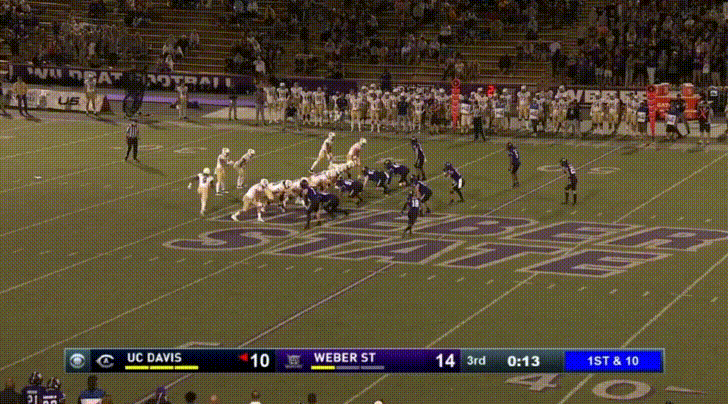
Tompkins can change directions on a dime which makes him hard to bring down, and will break weak arm tackles:
Tompkins runs the ball so well that defenses will try to key in on him to stop the run, and he consequently can often catch the defense off-guard with a pass:
He doesn’t throw it often, but he does have decent accuracy:
Because Tompkins is so good in often space, he’s even used as a receiver:
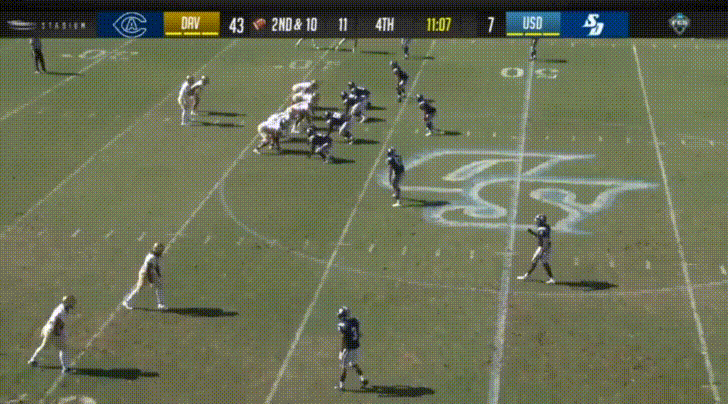
UC Davis will let Tompkins quarterback entire drives, so it’s less obvious than “the running QB is in, get ready for a run.” He’ll probably run the ball, but UC Davis will try a lot of misdirection using his versatility: maybe he’ll throw a screen pass to a running back lined up out wide, maybe it’s a legitimate pass play, or maybe Tompkins is used as a decoy. Regardless, Tompkins is able to get a first down all by himself if need be. Expect a lot of trickiness with Tompkins at the wheel.
Running back
Running back Ulonzo Gilliam is entering his final season just 155 yards shy of becoming UC Davis’s all-time leading rusher. He actually entered the transfer portal at the end of last season, but as far as I can tell (based on his Twitter) he should be returning. He’s been around so long that I actually covered him in my 2019 UC Davis preview (he ended up running for 89 yards and 1 TD against Cal’s defense). He’s a small but shifty runner that consistently finds yards. His go-to evasive maneuver is the spin move:
He has good fundamental technique and does a good job of keeping his balance:
And even though he isn’t the biggest back, he can still fight for tough yards:
He’ll also make some nice cuts:
I feel like the biggest knock against him at this point is that he’s been around for so long that teams are expecting him and game-planning against him, and so his production has tapered off a bit in recent years. He’s basically a constant for UC Davis at this point. He can catch passes, but his pass-catching last year was more as an extension of the run game (swing pass out wide, screen pass, etc). There were only a handful of snaps where he was used as a receiving target downfield.
The backup to Gilliam is sophomore Lan Larison. In high school, Larison was the Idaho State Champion in Steer Wrestling, as if steer wrestling championships were a thing in high schools outside of Idaho.
Larison is more of a power back:
But despite his hard-nosed running style, he’s also got a bit of speed and elusiveness as well:
Larison was also effective as a pass-catcher out of the backfield:
So much so, that he even lined up at wide receiver:
I mentioned QB Trent Tompkins’s versatility earlier, but much more under the radar is Lan Larison, who was also a quarterback in high school. UC Davis runs a lot of trick plays, but not one with Larison throwing the ball yet. Like Tompkins, he can also run, pass, or catch, so it’s worth keeping an eye on.
Receivers
UC Davis lost their top wide receiver, Jared Harrell, to graduation, but Cal fans should recognize their top returning pass-catcher from last year: former Cal tight end McCallan Castles.
It feels weird to preview a Cal player in one of these articles. I was a big fan of Castles when he was at Cal, and so I was disappointed when he transferred away from a crowded TE room that I thought he would soon lead.
Castles is a solid blocker. Watch here as he sets the initial block to spring RB Ulonzo Gilliam free (Castles is the guy dragging #2 to the sidelines):
Castles is bigger and stronger than lower-level competition like Tulsa, and here he does a nice job hauling in the touchdown pass:
In fact, Castles did a nice job of hauling in a few difficult and contested catches:

However, in spite of his ability to make some nice catches, he was not necessarily sure-handed, and would sometimes drop balls be needed to catch:
The next top receiver was WR CJ Hutton. Hutton is on the smaller side at wide receiver at 5’9”, and UC Davis typically tried to get him the ball in space (rather than as a downfield target). There were a couple plays UC Davis ran a lot last year— besides the double pass trick play, another frequent play was the jet sweep to CJ Hutton. It was never a very successful play, but they ran it a ton. I think it was most successful against Dixie State (now Utah Tech), who UC Davis absolutely murdered:
The fact that UC Davis ran this play so much despite limited success makes me think it was a part of setting up a different play later, stretching the field horizontally so they could take advantage of something on the defense later.
After McCallan Castles and CJ Hutton, the next top returning receivers are RB Ulonzo Gilliam and RB Lan Larison, which emphasizes how often the swing pass or screen pass are used as extensions of the run game.
After them is Castles’ backup tight end, Blake Thorpe, who is also a decent pass-catcher:
The only other receiver who stood out to me was WR Justin Poerio, who made some nice plays later in the season:
UC Davis also has a transfer this year from San Jose State, WR Andre Crump Jr. I have never seen him play, but the fact that they gave him jersey #9 makes me think he’ll probably be in the rotation. With UC Davis losing two of their top three wide receiver targets, it’s anyone’s guess who will fill that void. I’m guessing UC Davis will instead lean a lot more heavily on their run game.
Special teams
The kicker, Isaiah Gomez, has a career long field goal range of 45 yards. The bigger issue is that UC Davis will use their most versatile athletes on special teams to make an impact. Players like Trent Tompkins:
Or Lan Larison:
They also do well with kick coverage in general:
Cal hasn’t had particularly good special teams play, so hopefully Cal has a comfortable enough lead that a special teams miscue doesn’t make the difference in the game.
Conclusion
Last year, UC Davis made the FCS playoffs and they upset FBS Tulsa, so they are by no means a pushover. However, Sacramento State was a stronger team than UC Davis last year, and that’s before accounting for the production that UC Davis is losing. Cal handled Sacramento State last year, at least before easing off the gas pedal and letting Sac State back into the game (35-13 in the 3rd quarter turned into 42-30 in the 4th). Cal has some question marks around a new quarterback and offensive line, and so the opening game of the season should be a good litmus test to see what we can expect of the new offense: if UC Davis can do something to Cal (say, generate pressure on the QB, pick apart the secondary, etc), then it’s a safe guess that we will see more of the same when it comes time for Pac-12 play. As it stands now, though, I think anyone putting Cal on “upset alert” is probably a rube treating box scores as horoscopes. Cal should dominate in all facets of the game, and I’ll be a bit concerned if they don’t.
Go Bears!
You can find my full clips here.







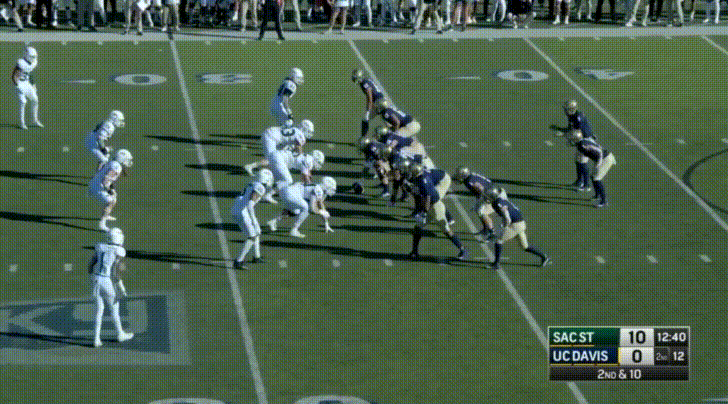



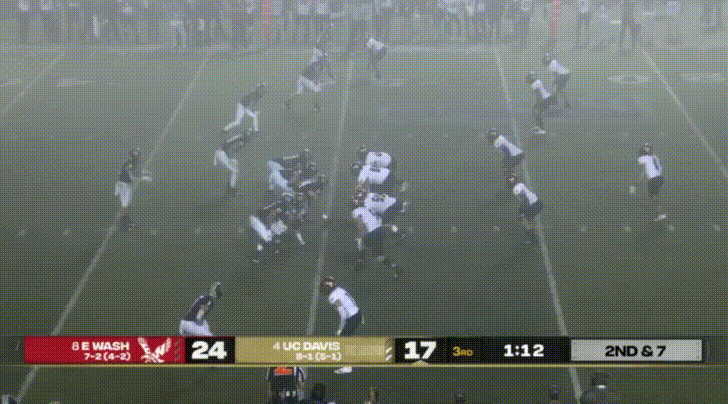

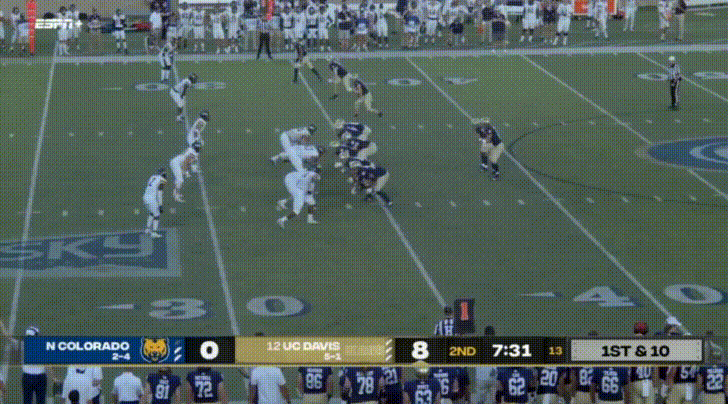




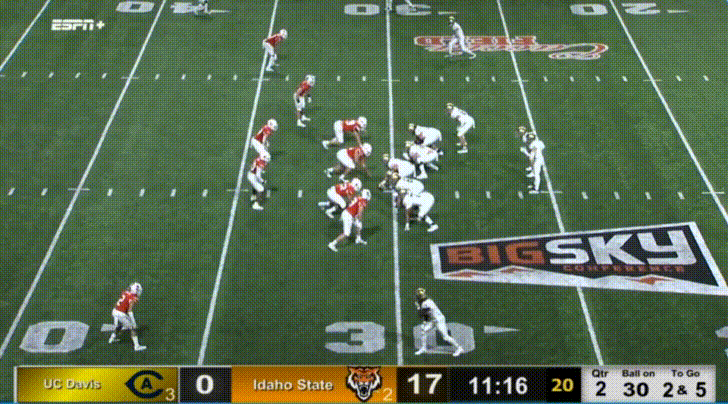






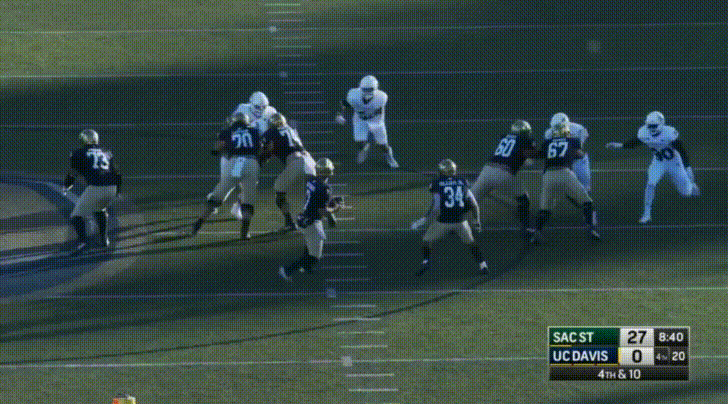




Ahhhh, finally feels like football season again.
Do you smell that? It's the smell of Cal football games coming to your living room!